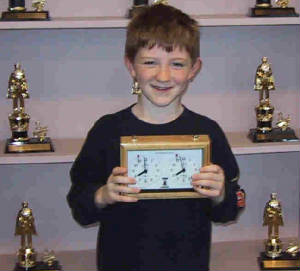 |
||
|
CLATSKANIE CHESS CLUB |
||
| | HOME | PLACES TO PLAY! | TOURNAMENTS | HISTORY | FAQ | PHOTOS | CONTACT | LINKS | INDEX | SPONSORS | NEWS & REVIEWS | |
|
The Care & Feeding of New Chess Clocks
|
|
|
Here's a few helpful hints to keep your clock happy!
|
|||
|
Your new clock should not be dropped, kicked, pounded, thrown or spilled on. It can probably survive these injuries but you want it to last a long, long time don't you? So don't do it!
Never actually feed your clock. That's just a figure of speech. Parents, in particular, frown on spagetti stains and peanut butter goo dribbled on expensive chess clocks. And remember, this is not a place to store your gum between rounds. Never
over wind your clock. It won't like it. You wouldn't like it either! Its sort
of like your mom standing on one side and your dad on the other and they both grab an arm and pull as hard and long as they
can. You'd end up dragging your arms behind you and that's not good when you're
trying to play chess. Now,
lets look at some facts Clocks
come with about 70 hours on each side. Most tournament games finish in 60 minutes. So that means, you have 140 games of chess.
Thats a lot of games! Lets
say you play in 25 tournaments a year, that's one every weekend for 6 months. In
those 25 tournaments, you use your clock for 5 games. That's 125 games in 6 months. And you still haven't used up all the time you have on your clock. And remember, if your opponent has a clock (and they sometimes do) that means you'll use your clock even
less. So here's the plan, only wind your clock on the 4th of July and Christmas. That's it. Other than that, leave it alone.
Electronic Clocks need special care too. Oh, I know, you're feeling all smug because you've got one of those expensive, fancy, electronic clocks and you never have to wind it. But do you have an extra battery for it? I thought not.
Chances are your electronic clock came with some pretty impressive directions in itty bitty print. Its a really good idea to figure out what all those buttons, knobs and doodads are all about before a competition. Tournament directors are busy people and it sometimes makes them grumpy to delay the start of a round while your Aunt Thelma tries to decipher the meaning of your clock. If
your clock gets dirty, clean it with a damp cloth. Don't take it in the bathtub or shower with you. It really won't like it. Write
your name on the bottom of your clock. They
all look alike. And even though your parents can tell that you belong to them,
clocks have no really distinguishing features like a cute nose or really big feet. In
tournaments, it's hard to tell who belongs to which clock. So mark it with a
permanent marker. Never
forget your clock. If you leave it home, you may have to forfeit a game. If you
leave it at a tournament, you may have to forfeit your allowance to pay for a new one. It all comes down to one simple thing. Respect your clock and it will last a good long while, maybe even longer than you! And someday, with any luck at all, your great great grandson may get to use it as a place to store his gum.
Don't have a clock? Want one? CLICK HERE!
|
|||
|

Custom Search
|
|||
